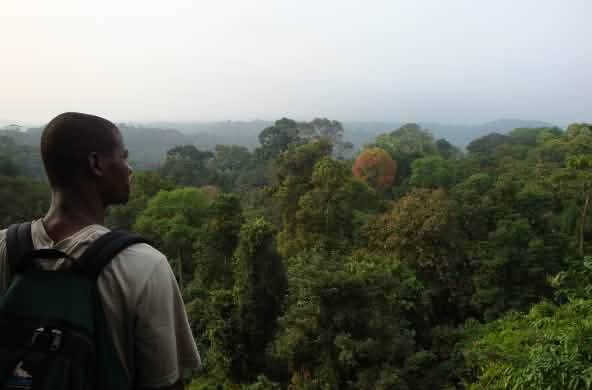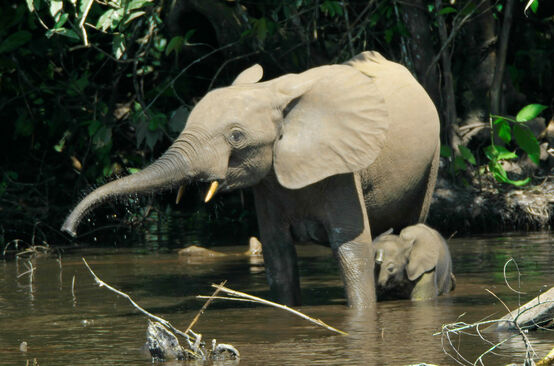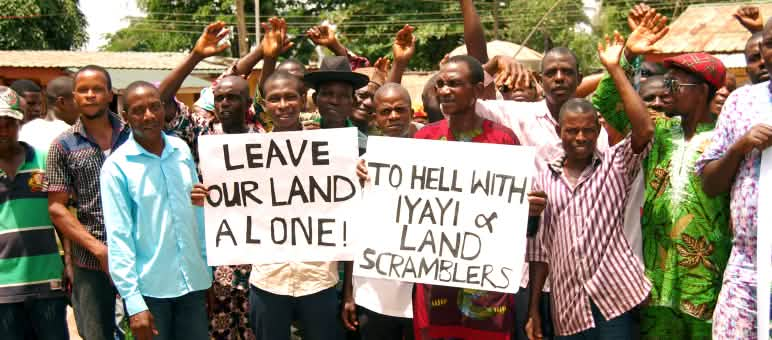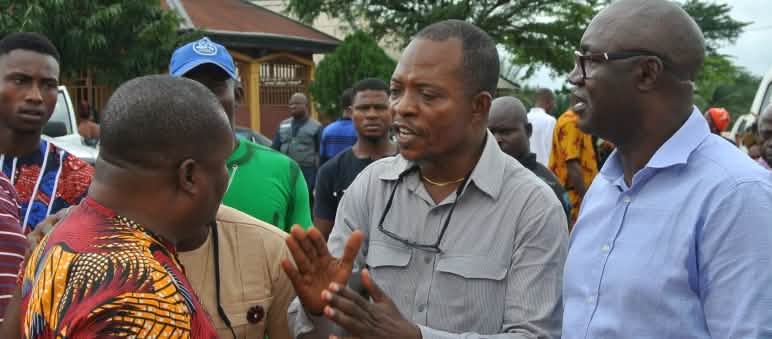Socfin plantations: Abuses and violence are a reality
Nigeria: Socfin has remained in the headlines: at the end of July, security forces beat a man to death on the edge of a palm oil plantation run by its subsidiary Socapalm. In April, Bloomberg News published a report on sexual violence taking place on plantations. Shortly before that, the Earthworm Foundation confirmed 69 percent of the complaints lodged by affected communities against Socfin.
Allegations proven on 12 plantations
What the Earthworm Foundation uncovered during a two-year investigation of Socfin’s palm oil and rubber plantations is deeply concerning: of 139 complaints from neighboring communities regarding land grabbing, displacement, destruction of sacred sites, poor working conditions, and sexual violence, 59 percent were confirmed as “justified” or “partially justified.” Only 30 percent were dismissed as “unfounded.” Often criticized for being too close to industry, the Earthworm Foundation conducted inspections on behalf of Socfin at twelve plantations across Africa and Asia and published the findings in a series of separate reports.
A Socfin spokesperson told Mongabay that 306 complaints are to be addressed through “targeted measures,” with 60 percent already implemented. The company’s “sustainable development department” regularly monitors the process, and Earthworm carries out “a final audit at the end of each cycle.” Socfin published updated action plans for several sites in June 2025.
Investigations into Socfin subsidiary Okomu Oil Palm Corporation
Rainforest Rescue has focused particularly on the subsidiary Okomu Oil Palm Corporation in Nigeria and supported local resistance through a petition. Contrary to reports from our partners, the Earthworm Foundation and the Nigerian firm Translantic Development Ltd., which it commissioned, consider the majority of allegations against Okomu as “unfounded.” However, instances of intimidation were “partially” confirmed. The report was published on June 28, 2024. Socfin regards itself as cleared and released an action plan in July 2024, with updates in November 2024 and February 2025. The latest update from June 2025 states that Okomu claims to have implemented all measures intended to improve conditions on site.
Environmentalists: report downplays allegations
Activists in Nigeria remain highly critical of Okomu’s conduct. The company is responsible for numerous social and human rights violations, particularly against women. Land rights are a central concern. The company deliberately sought to co-opt people, including smallholder farmers. Environmentalists told Mongabay that the Earthworm report is misleading and trivializes the very serious concerns of the people. Indigenous communities cannot enter or leave their ancestral lands without the company’s permission and supervision.
“The report is skewed towards the company’s interest at the expense of forest-dependent peoples,” says Rita Uwaka, project officer at Environmental Rights Action/Friends of the Earth Nigeria.
NGOs criticize the work of the Earthworm Foundation
On July 1, 2025, more than 30 environmental and human rights organizations worldwide, including Rainforest Rescue, issued a statement on the Earthworm reports about Socfin. It said:
“This is a damning indictment of one of the world's oldest and largest plantation companies – set up during colonial times and still operating in a colonial manner. Socfin’s key shareholder, the Bolloré group, and financiers are complicit, as they have benefited financially or helped fund the company’s activities that have contributed to these harms.”
The statement criticizes that the “action plans” by Socfin exclude the communities. “Persistent unaccountability” and “further harm” are anticipated.
As early as 2023, Emmanuel Elong of the organization Synaparcam in Cameroon described Earthworm’s mission as “greenwashing,” since the company “has not been known in the past for solving the problems it has uncovered.” He added, “They planned their project without consulting us and are now asking us to participate without preparation.”
The working practices of the Earthworm Foundation generally raise questions among environmentalists about the independence of companies like Socfin. The Earthworm Foundation rejects these claims.
Alarming extent of sexual violence
Bloomberg News published an article on April 16, 2025, about sexual harassment and violence against women working for Socfin in Liberia and Ghana. Similar allegations, including rape, have been documented in Sierra Leone and Cameroon as well. According to the report, women were forced to have sex with supervisors and threatened with job loss, public humiliation, and exclusion if they reported the assaults.
Since July 3, 2025, Socfin has committed to taking decisive action against sexual violence and harassment. This “absolute ban” applies to all employees and visitors to the company’s plantations and facilities.
Cameroon: new oil palms deny people their livelihood
Conflicts are increasing on the edges of plantations owned by Société camerounaise de palmeraies (Socapalm) in Cameroon, especially since the company began replacing old palms with new plantings.
On February 17, 2025, more than 40 organizations, including Rainforest Rescue, issued a statement saying the replanting had sparked “open conflict between the villagers and Socapalm,” negatively affecting people’s lives and social harmony and needing resolution.
Villagers had expected their land to be returned but this did not occur. Members of the Association of Women Residents of Socapalm-Edéa (AFRISE) planted banana trees to sustain themselves on land claimed by Socapalm.
On March 25, 2025, security forces including heavily armed soldiers acted violently against villagers in Apouh A Ngog. During the operation, which the company said aimed to secure the replanting, tear gas was used and about 6,000 banana trees were destroyed. Numerous organizations warned in a letter that the loss of these plants would exacerbate “poverty and hunger in the community.” Socfin insists it has legal rights to the land.
On July 14, 2025, a demonstration against the reforestation efforts in the village of Mbimbè was forcibly dispersed by security forces. Several villagers were reportedly detained for several days. Socfin rejected many of the accusations in a detailed statement.
Fatal violence near Socapalm plantations
On July 26, 2025, a local man named Frédéric Koum from the village of Eséka was beaten to death by security forces near Socapalm plantations according to reports. The incident arose after neighbors of the victim were accused of stealing palm nuts. Socfin expressed condolences to the victim's family in a press release. However, the security forces involved were hired by independent plantation owners, not Socapalm.
The theft accusation is frequently used to harass and criminalize people.
United against Socfin and Bolloré
We work within an international network of environmental and human rights organizations focused on the companies of the Bolloré Group, particularly Socfin and Okomu. Within this framework, we have supported the activist Ajele Sunday and his organization VOTEi. In 2022, we visited him in Nigeria and organized a meeting with affected communities.
Another contribution to the network's work was the launch of our petition “Stop Nigeria's lawless palm oil juggernaut!”, which has been signed by 126,440 people.
Building on the cautious Earthworm reports, the pressure on Socfin, and the public attention raised, the anti-Socfin network continues to develop its strategies. Currently, beyond Okomu, Socfin subsidiaries in Sierra Leone, Liberia, Ghana, and Cameroon are the primary focus of criticism. Since gaining more signatures for this petition is unlikely to generate significant impact, we are concluding the campaign.
We will, however, remain active in the network against Socfin as affected communities continue to suffer greatly from the palm oil and rubber business — as outlined above.
This page is available in the following languages:

Protecting Africa’s rich natural heritage
The Congo Basin is home to the second largest rainforest in the world, habitat of gorillas, chimpanzees and forest elephants. Our partners courageously defend these forests.

Stop Nigeria's lawless palm oil juggernaut!
Plantation companies in Nigeria are clearing forests with breathtaking speed and leaving destroyed livelihoods and human rights violations in their wake.

